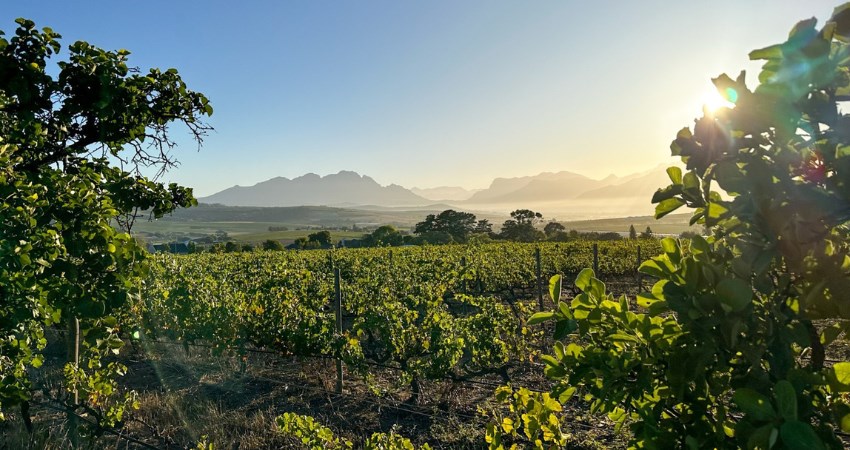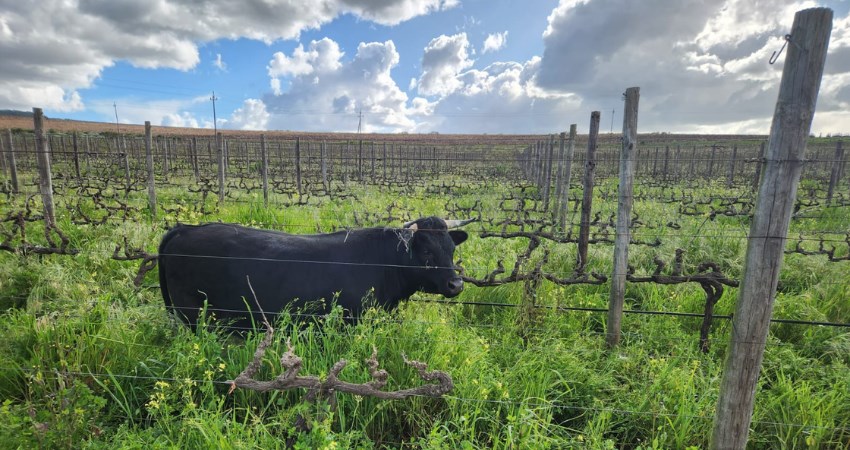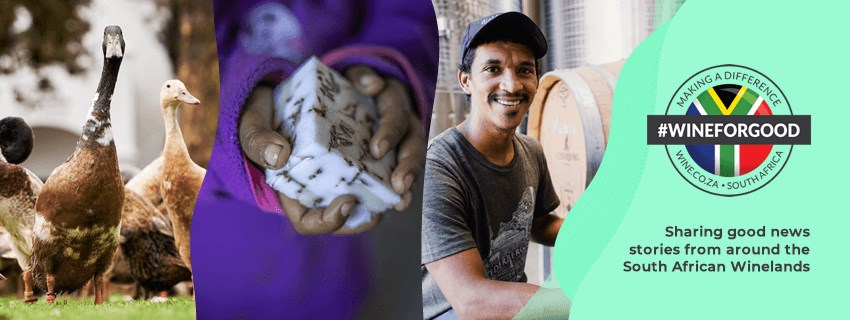
Healthy, biodynamically farmed vineyards on the Reyneke farm. Photo: Reyneke Wines
Earth-friendly trends may continue as passing fads or, at worst, as instances of greenwashing. Alternatively, they can be harnessed as potent tools in the pursuit of sustainability, particularly within South African wineries.
As pressure on natural resources continues to increase, the importance of sustainability and environmental stewardship is increasingly evident. ProWein 2024, where sustainability once again took centre stage, witnessed heightened involvement from NGOs like the Sustainable Wine Roundtable and the International Wineries for Climate Action (IWCA).
Locally, wine producers are increasingly weathering the repercussions of global warming. While many high-end producers endorse sustainable practices, some are still grappling with decisions regarding organic certification, balancing the associated financial implications with consumer perceptions.
Amidst these challenges and allowing differing views on organic versus biodynamic practices, one guiding principle continues to offer hope for a more sustainable future: a return to fundamentals, both in embracing and meeting the demands of eco-friendly trends.
Returning to basics
Soil scientist Bennie Diedericks of Resalt advocates for holistic farm management.
"We already know all the basic farming principles we need to know but we often fail to implement it,” says Diedericks. “To be sustainable, a farmer should maintain a balance between the three interactive components of economics, society, and ecology.”
According to Diedericks, the conservation and rehabilitation approach of regenerative agriculture is gaining traction, founded on six principles: the farm as a constantly changing living organism; minimum tillage; avoiding bare soil surfaces; keeping live roots in the soil; crop diversity; and an animal factor.
Diedericks notes that many South African wine farmers have long adhered to most of these principles, particularly through practices like cover cropping, and could be considered world leaders in this regard. “The soil is one variable that all farmers can do something about,” he says. “Organic matter in the soil is the only living part of a soil; it is important to create favourable conditions for soil microorganisms.”
Diedericks believes one cannot have a healthy ecosystem without any animals. “There is ongoing learning about the intricate microbiology involved in reintroducing animals to vineyards,” he says. He advises farmers to start small with chickens or ducks, but ideally to get ruminants on their farms, such as sheep, cattle, or goats.

A Dexter cow in the vineyard at Hartenberg Wine Estate, Bottelary Hills. Photo: Bennie Diedericks
Transparent land stewardship
Johan Reyneke of Reyneke Wines in Polkadraai, a pioneer of biodynamic farming in South Africa, underscores three crucial concepts for a sustainable future. Firstly, he echoes Diedericks in advocating for “land caring” or regenerative agriculture as a solution to pressing environmental challenges.
"As a farmer, it's sobering to acknowledge that agriculture ranks among the top five contributors to global warming," says Reyneke. "Yet, it also presents significant opportunities to mitigate its effects."
Reyneke emphasises the importance of achieving carbon negativity and creating an environment more resistant to global warming. “If you can raise humus levels in soil, plants become more resistant to pests; if you can raise it to 5% of your soil's content, you can raise resistance by up to 300%.”
He illustrates the benefits of transitioning to biodynamic practices, citing cost savings and yield improvements. “We saved from spending R100 000 on fertiliser, and R130 000 on organic compost, to zero spending,” Reyneke explains. “We diversified our income through our vineyard cattle. And we increased our yield, from 8 tonnes per hectare when farming conventionally, to a record of between 10 and 11 tonnes per hectare this year.”
Secondly, Reyneke promotes “land sparing” to combat biodiversity loss. He emphasises the importance of diversity in countering the monoculture prevalent in conventional farming.“One creates stability through diversity,” Reyneke says. “The ideal is to replicate the diversity of the wilderness on your farm by creating wilderness pockets, connected through corridors, to increase biodiversity as well as natural pest control.”
Reyneke lauds the concept of the Bottelary Hills Renosterveld Conservancy. “This initiative is reminiscent of the ideal of transfrontier parks, although on a smaller scale,” he says. “As a community initiative, establishing wilderness strips and conserving fynbos, this benefits everyone, and is a worthy example of collective land caring and sharing.”
Lastly, Reyneke stresses the importance of market-driven farming, noting shifting consumer preferences towards sustainability and transparency, especially among younger generations.
Transforming the nature of the soil
Winemaker Frank Meaker of Canetsfontein Organic Wine Estate in Wellington affirms the sentiment that organic and biodynamic approaches are crucial for the future. "As farmers, the soil is our anchor," says Meaker. He emphasises the transformative potential of allowing nature to take its course in soil over the long term, benefiting future generations.
Meaker has been involved with organic wine philosophy since 2006. At Canetsfontein, he has taken up the challenge by owner Alexander Falk to produce organic wines with zero sulphur. After removing all existing vineyards in 2022, they have started a replanting programme whilst buying in grapes from accredited organic growers all over the Western Cape. Meaker has since created the Canetsfontein Cliffhanger, a vegan, 100% organic and sulphur-free red wine that is naturally preserved with honeybush and rooibos.
“For winemaking to be sustainable, we should look at its environmental residues,” Meaker says. “Your consumers health should be a part of your drive and responsibility, as going organic means investing into a better world for future generations.”
Meaker anticipates challenges for wineries in adapting to global warming conditions. “We must adapt to new seasonal patterns, save water and electricity, and get the soils alive with organic living material. We have to consider basics such as your leaf’s lifespan and the survival of your vine, given recent examples such as the Piketberg region experiencing more than 30 days of temperatures reaching 40 degrees Celcius and higher during the growing season,” he explains.
Like Reyneke, Meaker envisions a landscape where neighbouring farms embrace nature-first approaches, creating a positive impact both on the environment and on the future potential for sustainable wine tourism in South Africa.

There are plenty of good news stories from the South African Winelands. The #wineforgood campaign, launched by wine.co.za in June 2016, is all about sharing these positive and uplifting stories. We dedicate the month of April to our #wineforgood campaign each year, sharing a good news story every day. Join us in spreading the good news about South African wine. If you'd like to submit a story, please email editor@wine.co.za.